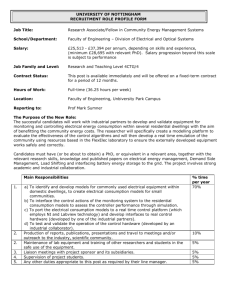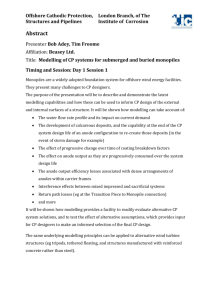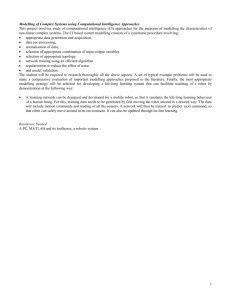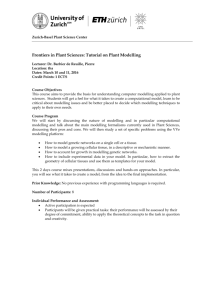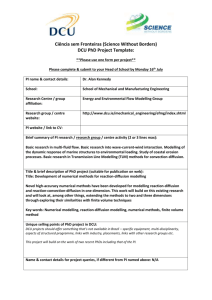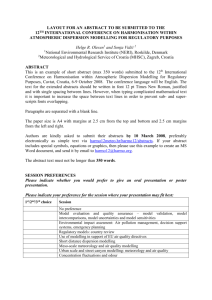recruitment role profile form - Jobs
advertisement
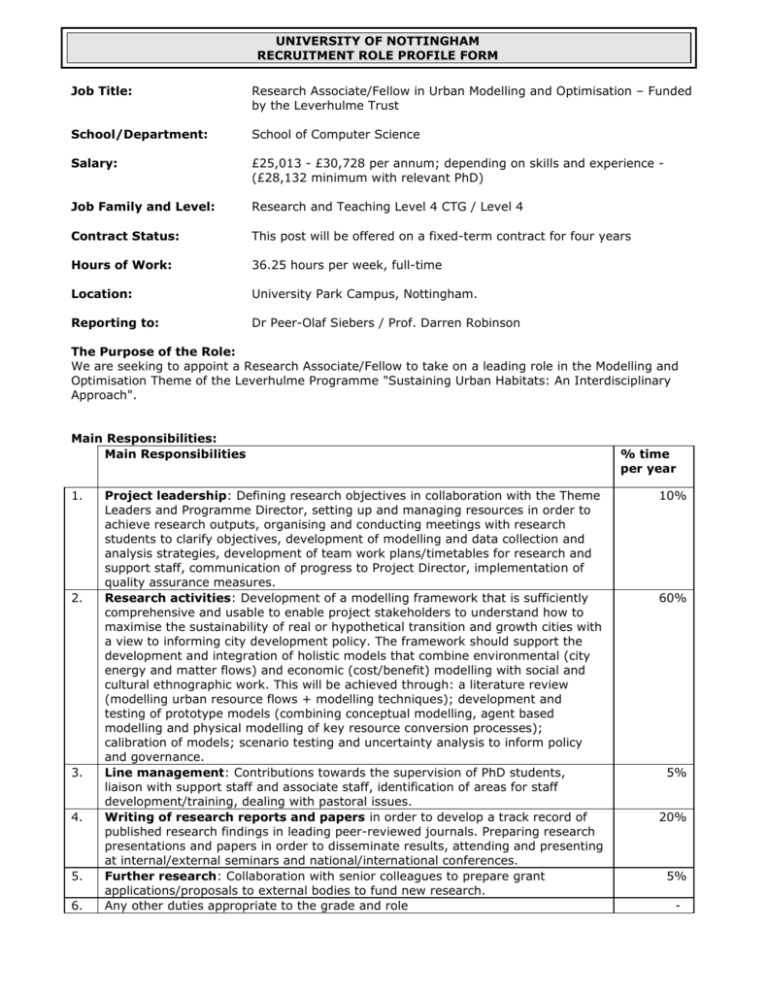
UNIVERSITY OF NOTTINGHAM RECRUITMENT ROLE PROFILE FORM Job Title: Research Associate/Fellow in Urban Modelling and Optimisation – Funded by the Leverhulme Trust School/Department: School of Computer Science Salary: £25,013 - £30,728 per annum; depending on skills and experience (£28,132 minimum with relevant PhD) Job Family and Level: Research and Teaching Level 4 CTG / Level 4 Contract Status: This post will be offered on a fixed-term contract for four years Hours of Work: 36.25 hours per week, full-time Location: University Park Campus, Nottingham. Reporting to: Dr Peer-Olaf Siebers / Prof. Darren Robinson The Purpose of the Role: We are seeking to appoint a Research Associate/Fellow to take on a leading role in the Modelling and Optimisation Theme of the Leverhulme Programme "Sustaining Urban Habitats: An Interdisciplinary Approach". Main Responsibilities: Main Responsibilities 1. 2. 3. 4. 5. 6. Project leadership: Defining research objectives in collaboration with the Theme Leaders and Programme Director, setting up and managing resources in order to achieve research outputs, organising and conducting meetings with research students to clarify objectives, development of modelling and data collection and analysis strategies, development of team work plans/timetables for research and support staff, communication of progress to Project Director, implementation of quality assurance measures. Research activities: Development of a modelling framework that is sufficiently comprehensive and usable to enable project stakeholders to understand how to maximise the sustainability of real or hypothetical transition and growth cities with a view to informing city development policy. The framework should support the development and integration of holistic models that combine environmental (city energy and matter flows) and economic (cost/benefit) modelling with social and cultural ethnographic work. This will be achieved through: a literature review (modelling urban resource flows + modelling techniques); development and testing of prototype models (combining conceptual modelling, agent based modelling and physical modelling of key resource conversion processes); calibration of models; scenario testing and uncertainty analysis to inform policy and governance. Line management: Contributions towards the supervision of PhD students, liaison with support staff and associate staff, identification of areas for staff development/training, dealing with pastoral issues. Writing of research reports and papers in order to develop a track record of published research findings in leading peer-reviewed journals. Preparing research presentations and papers in order to disseminate results, attending and presenting at internal/external seminars and national/international conferences. Further research: Collaboration with senior colleagues to prepare grant applications/proposals to external bodies to fund new research. Any other duties appropriate to the grade and role % time per year 10% 60% 5% 20% 5% - Knowledge, Skills, Qualifications & Experience: Essential Desirable Qualifications / Education PhD or equivalent (or about to obtain) with a strong scientific computing component. Masters Degree, or equivalent, in Mathematical, Physical or Computational Science. Skills/Training Object-oriented programming (C++). Strong organizational skills and project management. Excellent communication and presentation skills. Demonstrated creativity and leadership in problem solving. Significant demonstrated ability of team work. Experience of publication of high quality academic journal papers and reports. Thorough understanding of complexity science and agent-based modelling Experience in social simulation Experience in urban/regional modelling Database design and development Experience Leading the development of complex object-oriented simulation software Liaising with external partners. Supervision of PhD students Willingness to travel Decision Making i) Taken independently by the role holder; Day-to-day processes and procedures, including quality assurance measures, data storage and archiving protocol. Individual short-term plans for research students and administrative / technical staff ii) Taken in collaboration with others; Working methods (Dr Siebers / Prof Robinson) Structure of research reports and papers (Dr Siebers / Prof Robinson) Pastoral issues (Dr Siebers) Identification of areas for staff development and target source for training (Dr Siebers) Identification of areas for future research (group peers) Data collection and analysis strategy (group peers) Research direction and dissemination – form and content (Dr Siebers / Prof Robinson) Scheduling of long-term research plans (Dr Siebers / Prof Robinson) Development of proposals for extension of existing or for new projects (Dr Siebers / Prof Robinson) iii) Referred to the appropriate line manager (Prof. Robinson) by the role holder; Disciplinary decisions Dissemination strategy Research direction Staff recruitment Additional Information We are looking for candidates with a background in physics, mathematics, computing or engineering science with an interest in social and economic simulation and strong scientific computing skills. Your first degree or equivalent will be first class or a high upper second and you will have recently completed or be about to complete a PhD or equivalent with a strong scientific computing component to it. Candidates with research experience in complexity science will be particularly welcome. Applicants will be considered on an equal basis, subject to the relevant permission to work in the UK as defined by the requirements set out by the UK Border and Immigration Agency. Please visit http://www.ukba.homeoffice.gov.uk/ for more information.

